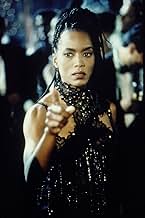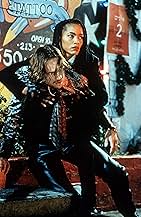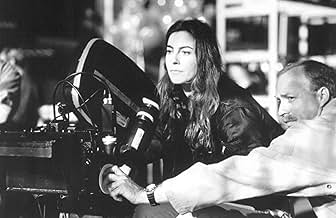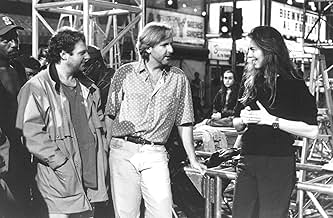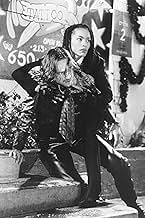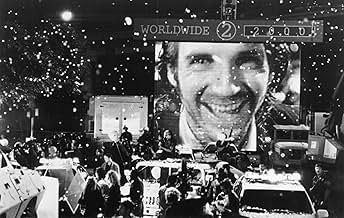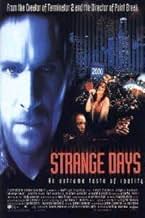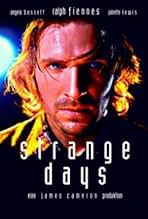Un expolicía que ahora es un timador descubre una conspiración en Los Ángeles por accidente.Un expolicía que ahora es un timador descubre una conspiración en Los Ángeles por accidente.Un expolicía que ahora es un timador descubre una conspiración en Los Ángeles por accidente.
- Premios
- 2 premios ganados y 4 nominaciones en total
Argumento
¿Sabías que…?
- TriviaDirector Kathryn Bigelow found that no existing camera system could accomplish the shots necessary for the point-of-view sequences, so the research division of Lightstorm Entertainment (the company of writer/producer James Cameron, who was Bigelow's husband at the time) spent a full year designing and fabricating a special camera for the production. Weighing only 8 pounds, the 35mm camera literally fit in the palm of the hand and featured interchangeable lenses, remote follow focus, and video assist (necessary since the camera had no viewfinder). The camera was then mounted on a SteadiCam-style portable rig, which gave the camera stability and mobility similar to the human eye.
- ErroresThe safety cable is visible during the final 10 or 20 feet of Max's fall.
- Versiones alternativasThe older special edition laserdisc and DVD are the same. Both formats feature two deleted scenes and other extras. The solitary difference is that the laserdisc contains the Skunk Anansie music video for "Selling Jesus", which was not included on the US DVD release. The only DVD to feature the music video is the German special edition.
- ConexionesEdited into Strange Days: Deleted Scenes (2002)
Opinión destacada
The answer being, of course, yes I am impressed.
What a thoroughly enjoyable film Strange Days is. Fast-moving and occasionally violent, it's not high art but then neither is it dumbed-down fodder and it has much to commend it. The central plot revolves around an ex-cop (Fiennes, doing a - to my ears anyway - convincing American accent) peddling FBI technology on the black market. The SQUID technology (Super conducting QUantum Interface Device) electronically absorbs information from the central cortex and allows users to experience the thrill of another's sensations - be it murder, sex, robbery, etc. Of course, this central idea, while fascinating, does derive pretty much directly from a Twilight Zone episode. Were this a "classic" Zone episode from the b/w era, then people would have picked it up straight away and the game would be over. As it is, the inspiration comes from one of the colour Twilight Zone episodes which had even less viewers than Strange Days and so the movie can rest assured it is safe in obscurity. (Give up? Okay, it was episode 23, season three, 1989, "The Mind of Simon Foster". I'm an anorak, I know these things).
But whether such were intentional is pretty much irrelevant as the magpie technique of this film takes from many texts and builds something greater than the parts. One of the two greatest science fiction films of the 90s - the other being the excellent "Twelve Monkeys" - both have built-in sell-by dates by fixing their time period in a very near locale. Hence while the supposed date of Monkeys is long past at 98, this film now becomes a historical document as of New Year's Eve 1999. But then does it follow that we will stop watching 2001 in 2002? Hopefully not, and Strange Days is one that too deserves to be revisited in years to come.
The reason why I commend it most is its rewarding political stance. The development that gets adhered onto the "Squid" plot directly references the beating of Rodney King. Such contemporary referencing may again date it as quickly as the '99 setting, but then we also have Angela Bassett as a very empowered, yet caring black woman. Note how she and Lenny have exchanged traditional gender roles in this film, yet this feels not like some "macho woman" schtick but genuine characterisation. Lenny is a likeable, wisetalking street peddler who spends the film as a human punchbag. Gone is the cliched jaw-breaking action man role for him, instead his only retort to violence is "I'll give you my Rolex". This sense of, if you like, PC-ness, can also be evidenced with the lesbian couple kissing as the year 2000 breaks, or the (one scene only, admittedly) appearance of a disabled man as a central character.
However, the boundary-pushing elements of this movie are tainted by the appearance of Juliet Lewis in the film. A capable actress, her only role appears to be as a receptacle for various men's sexual needs or to gratuitously expose her breasts on multiple occasions. This is a great shame, and a pity that a film which has such high intentions in almost every other area should fall back on unfortunate portrayal.
The dialogue is pitched just about right without being particularly clever, though occasionally it stalls. "You're like a goddamn cruise missile, targetted on making it", Fiennes tells Faith (Lewis) at one point, managing to keep a straight face. Later, Bassett must endure having to say "These are used emotions. It's time to trade them in" and not use her gun on the scriptwriter. When the credits do roll, it's perhaps no surprise that James Cameron was the co-writer, as its slight perfunctory, by-the-numbers stance often reminds one of the machinations of "Titanic". Tom Sizemore as Max is every inch the one-dimensional Cameron "character", while plot twists sometimes feel heavily engineered. Maybe Jay Cocks is responsible for the script's more "human" feel, with particular note going to the moral debate of whether or not to expose the LAPD's murder of an influential black rapper. The two leads debate (internally, as well as verbally, a first for a Cameron movie) the implications and the possible consequences of such an action. Despite its flirtation with the mainstream, Strange Days is a film that dares to pervert the traditional course of Hollywood into a future that is worth seeing. Perhaps predictably, it made little impact at the box office.
What a thoroughly enjoyable film Strange Days is. Fast-moving and occasionally violent, it's not high art but then neither is it dumbed-down fodder and it has much to commend it. The central plot revolves around an ex-cop (Fiennes, doing a - to my ears anyway - convincing American accent) peddling FBI technology on the black market. The SQUID technology (Super conducting QUantum Interface Device) electronically absorbs information from the central cortex and allows users to experience the thrill of another's sensations - be it murder, sex, robbery, etc. Of course, this central idea, while fascinating, does derive pretty much directly from a Twilight Zone episode. Were this a "classic" Zone episode from the b/w era, then people would have picked it up straight away and the game would be over. As it is, the inspiration comes from one of the colour Twilight Zone episodes which had even less viewers than Strange Days and so the movie can rest assured it is safe in obscurity. (Give up? Okay, it was episode 23, season three, 1989, "The Mind of Simon Foster". I'm an anorak, I know these things).
But whether such were intentional is pretty much irrelevant as the magpie technique of this film takes from many texts and builds something greater than the parts. One of the two greatest science fiction films of the 90s - the other being the excellent "Twelve Monkeys" - both have built-in sell-by dates by fixing their time period in a very near locale. Hence while the supposed date of Monkeys is long past at 98, this film now becomes a historical document as of New Year's Eve 1999. But then does it follow that we will stop watching 2001 in 2002? Hopefully not, and Strange Days is one that too deserves to be revisited in years to come.
The reason why I commend it most is its rewarding political stance. The development that gets adhered onto the "Squid" plot directly references the beating of Rodney King. Such contemporary referencing may again date it as quickly as the '99 setting, but then we also have Angela Bassett as a very empowered, yet caring black woman. Note how she and Lenny have exchanged traditional gender roles in this film, yet this feels not like some "macho woman" schtick but genuine characterisation. Lenny is a likeable, wisetalking street peddler who spends the film as a human punchbag. Gone is the cliched jaw-breaking action man role for him, instead his only retort to violence is "I'll give you my Rolex". This sense of, if you like, PC-ness, can also be evidenced with the lesbian couple kissing as the year 2000 breaks, or the (one scene only, admittedly) appearance of a disabled man as a central character.
However, the boundary-pushing elements of this movie are tainted by the appearance of Juliet Lewis in the film. A capable actress, her only role appears to be as a receptacle for various men's sexual needs or to gratuitously expose her breasts on multiple occasions. This is a great shame, and a pity that a film which has such high intentions in almost every other area should fall back on unfortunate portrayal.
The dialogue is pitched just about right without being particularly clever, though occasionally it stalls. "You're like a goddamn cruise missile, targetted on making it", Fiennes tells Faith (Lewis) at one point, managing to keep a straight face. Later, Bassett must endure having to say "These are used emotions. It's time to trade them in" and not use her gun on the scriptwriter. When the credits do roll, it's perhaps no surprise that James Cameron was the co-writer, as its slight perfunctory, by-the-numbers stance often reminds one of the machinations of "Titanic". Tom Sizemore as Max is every inch the one-dimensional Cameron "character", while plot twists sometimes feel heavily engineered. Maybe Jay Cocks is responsible for the script's more "human" feel, with particular note going to the moral debate of whether or not to expose the LAPD's murder of an influential black rapper. The two leads debate (internally, as well as verbally, a first for a Cameron movie) the implications and the possible consequences of such an action. Despite its flirtation with the mainstream, Strange Days is a film that dares to pervert the traditional course of Hollywood into a future that is worth seeing. Perhaps predictably, it made little impact at the box office.
- The_Movie_Cat
- 11 ene 2000
- Enlace permanente
Selecciones populares
Inicia sesión para calificar y agrega a la lista de videos para obtener recomendaciones personalizadas
- How long is Strange Days?Con tecnología de Alexa
Detalles
- Fecha de lanzamiento
- País de origen
- Idioma
- También se conoce como
- Strange Days
- Locaciones de filmación
- Productora
- Ver más créditos de la compañía en IMDbPro
Taquilla
- Presupuesto
- USD 42,000,000 (estimado)
- Total en EE. UU. y Canadá
- USD 7,959,291
- Fin de semana de estreno en EE. UU. y Canadá
- USD 31,062
- 8 oct 1995
- Total a nivel mundial
- USD 7,959,291
- Tiempo de ejecución2 horas 25 minutos
- Color
- Mezcla de sonido
- Relación de aspecto
- 1.78 : 1(original/open matte)
Contribuir a esta página
Sugiere una edición o agrega el contenido que falta

Principales brechas de datos
By what name was Días extraños (1995) officially released in Canada in French?
Responda

